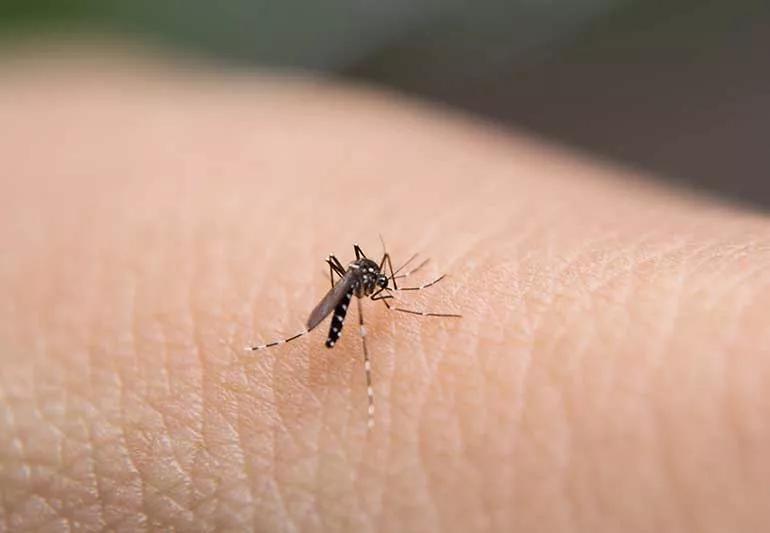Zika is still a threat for some travelers, especially if you’re pregnant or trying to conceive

Remember Zika? It may have been a few years since you heard news headlines warning of it, but in many parts of the world, some risk still remains — especially for people who are pregnant or want to become pregnant.
Advertisement
Cleveland Clinic is a non-profit academic medical center. Advertising on our site helps support our mission. We do not endorse non-Cleveland Clinic products or services. Policy
But it isn’t something you need to worry about contracting at home in the United States, says Ob/Gyn Oluwatosin Goje, MD, who specializes in infectious diseases. “Zika is not an epidemic in the U.S.,” she confirms. “In the continental U.S., the last cases of Zika transmission were reported in Florida and Texas in 2017.”
Since 2018, there have been no reports of Zika virus transmission by mosquitoes in the continental United States. And since 2019, there have been no confirmed Zika virus disease cases reported from United States territories.
But in other parts of the world, the Zika virus still looms. Dr. Goje explains what you need to know about it when you travel.
In 2015 and 2016, a Zika outbreak had the world on edge, beginning in Brazil and soon traveling through South and North America. The U.S. saw transmission in Florida, Texas, Puerto Rico and the Virgin Islands.
Since then, cases have dramatically declined. As of the end of 2022, no countries are experiencing active Zika outbreaks — but that doesn’t mean the virus has disappeared.
“There’s been a massive decrease in reported Zika transmission, but some countries are still at risk,” Dr. Goje states. “There is currently no vaccine to prevent or medicine to treat Zika.”
Advertisement
The Zika virus is most commonly spread through Aedes aegypti mosquitoes (also known as yellow fever mosquitoes), which thrive in tropical climates.
It can also be transmitted through sex and pregnancy. Infection during pregnancy can cause other severe fetal birth defects.
“One of the main reasons not to travel to areas at risk of Zika is that it is known to cause birth defects in babies born to parents infected with the virus,” Dr. Goje notes.
Zika can cause serious birth defects, including brain damage and microcephaly, a condition that causes a baby to be born with a smaller head than expected. Zika also increases the risk of:
If you’re pregnant or trying to conceive (whether you could become pregnant yourself or impregnate a partner), medical professionals recommend that you proceed with caution when traveling to places with Zika risks.
To learn whether there’s a risk of Zika in your travel destination, Dr. Goje recommends first checking the U.S. Centers for Disease Control and Prevention’s (CDC) interactive Zika map, which lists threat levels by country. It’s divided into these categories:
If you’re debating traveling to a country where Zika is a risk, the decision to cancel or postpone your trip is personal and complex.
“You’ll have to consider your travel destination and protect yourself accordingly,” Dr. Goje says. “You’ll also need to share your decision with your partner and doctor and discuss what that means.”
If you find yourself traveling to an area that has or has had Zika, try to avoid mosquito bites. During your trip, you should:
If you could become pregnant or could get someone pregnant, you’ll have to take precautions when you get home, too.
“If a couple decides that they’re going to travel to a Zika destination, they will need to decide that they won’t try for pregnancy for the first three months that they’re back,” states Dr. Goje. “This can mean abstaining from sex altogether or using contraception, like birth control or condoms.”
If you’re not part of a couple but are sexually active, the amount of time that you should abstain or use contraception when you get home depends on what your sex recorded at birth was:
Advertisement
Doctors can help treat the symptoms of Zika, but there still isn’t a cure. “People who travel globally should know how to prepare and what to do and look for upon their return,” Dr. Goje advises. “Prevention and awareness are your best defenses.”
Advertisement
Learn more about our editorial process.
Advertisement

You can catch this highly contagious virus through contaminated food, water, droplets and more

Use a bleach solution to sanitize surfaces like doorknobs, counters, toilets and light switches

Start slowly with clear fluids, and then move to bland, easy-to-digest foods

Transmission typically involves skin-to-skin contact, but the virus can also linger on surfaces

Time of onset and duration of symptoms tell the story

It’s not just smoking and genetics that can increase your risk of cancer

Mpox (monkeypox) is transmitted through skin-to-skin contact, including sex

Fatigue leads a list of telltale signs of the ‘kissing disease’

The best parenting style balances enforcing rules and showing plenty of love

Tips include cutting back on sugar, focusing on exercise and managing stress

It can be harder to let go when you’ve invested time, energy and emotions — but it might be the healthier choice long term